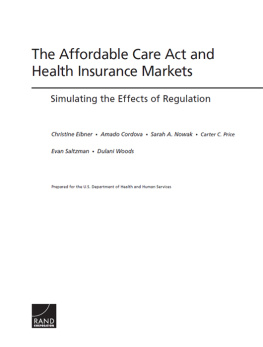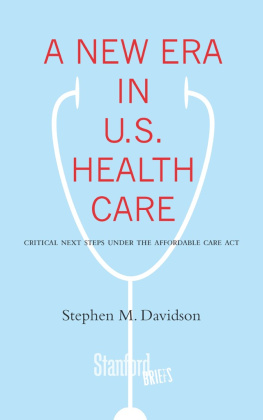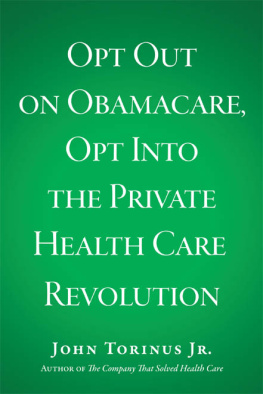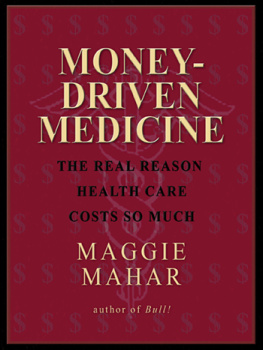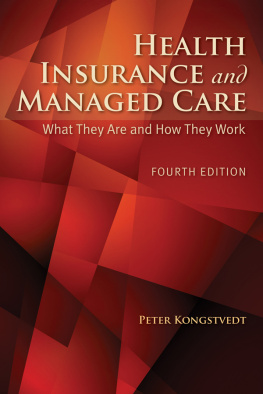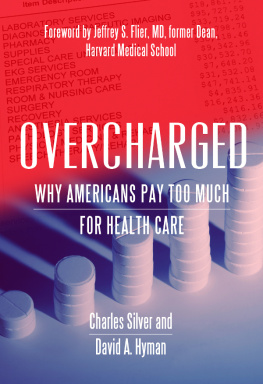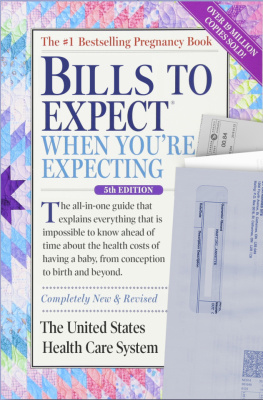Thank you for downloading this Touchstone eBook.
Join our mailing list and get updates on new releases, deals, bonus content and other great books from Touchstone and Simon & Schuster.
C LICK H ERE T O S IGN U P
or visit us online to sign up at
eBookNews.SimonandSchuster.com
Contents
To Carole, who told me to write this book to help others find affordable care.
CHAPTER 1

How to Use This Book
How I Became a Health Care Detective, and How You Can, Too
No one should be surprised to get cancer. More than half of us will be diagnosed with the disease in our lifetimes. Still, when I got hit with it, I was stunned.
I got the phone call so many of us have learned to dread in November 2008 while I was at a high point in my career. I was the editor in chief of Readers Digest International, managing the companys fifty worldwide editions in twenty-two languages, and I had just helped launch a Readers Digest magazine for mainland China. At a kickoff lunch in Beijing, our select group of executives was warned to avoid politics. But after several rounds of toasts, the Chinese team leader demanded my opinion of the U.S. presidential campaign. I surprised him and the other older Communist Party leaders there by boldly predicting that the young black candidate, Barack Hussein Obamaobviously a person of colorwould become Americas next president; days later, I gained immeasurable stature with the Chinese when I was proven right.
The magazine launch was a historic accomplishment for our company. DeWitt Wallaces once virulently anti-Communist magazine was now on sale in Red China. Population: 1.3 billion.
I loved the challenge of my job and the travel. I would fly from London to Beijing for a business lunch and fly back the same day, holding meetings in the car to and from the airports. Surely, I thought, the occasional shortness of breath I had first felt walking downhill from Londons Piccadilly Circus had something to do with flying around the world three times in ten months. It couldnt be anything more than that; after all, I was only sixty-six and jogging four miles a day. Still, I was concerned enough to see our family doctor, an excellent internist. He said I was anemic, probably because of the demands of my job. But he wanted me to see an oncologist out of caution to rule out anything serious.
The oncologist was upbeat. He ran a series of tests, including a spinal tapagain to rule out anything serious. He said he would call in a few days with the results.
I got his call in my favorite hotel room in London overlooking St. Jamess Placea block from lovely St. Jamess Park, where I jogged around the lake after work as regal white swans floated by. I felt fine.
The oncologist, Raymond Pastore, a normally jolly fellow, didnt sound upbeat. Slowly I realized that he was telling me that, sorry, his tests had confirmed that I had a relatively rare form of blood cancer called multiple myeloma. The walls of the room closed in on me. I was trapped and utterly alone. I had just gotten a death sentence three thousand miles away from my wife, Carole, and my family, back home in New York.
This is deadly serious, I heard myself saying. There was a pause, and Dr. Pastore said, It is serious. But it is not necessarily deadly. We can treat this cancer and get it under control.
And we did.
My doctors assured me that I was in a smoldering presymptomatic phase that could last for God knows how long. But the disease would inevitably cross the line to active. Then Id have to confront my cancer by enduring months of debilitating chemotherapy, followed by a lifetime of drug maintenance. A pill a day to keep the cancer away.
My cancer became active eighteen months later, and if I had not undergone chemo, I could have died within a year. Since the chemo, my maintenance drugs have kept my cancer in check for the past six years. Aside from getting on a first-name basis with more doctors than I want to shake a checkbook at, Ive lived rather normally. My wife, Carole, our two daughters, son-in-law, and two adorable grandsonsnot to mention meare very grateful for that. If I drive carefully, dont try to break up fights in the subway, and dont play with guns, I should live to my eighties. What more could anyone ask?
Except there is a problem. The wonder drugs that are keeping me alive are insanely expensive. The pill I take each day now costs $809.52. If I had to pay that retail pricewhich works out to about $17,000 a month, or $204,000 a yearthe pill would keep me alive long enough to file for bankruptcy. After more than fifty years of working and saving, I would have to choose between going broke or deciding to stop taking my medicine.
Still, I have been luckier than others. I have pills that control my cancer. Not everyone can say that.
In addition, my old employer, Time Inc., picked up my drug costs for the first few years. The most I had to pay for all of my medications, including my cancer pill, was $1,000 a year. But then in November 2012, the company announced a drastic cut in its health care benefits. Time Inc. would no longer cap employees annual drug costs. Suddenly, beginning a month later in January 2013, there would be no limit on how much my out-of-pocket drug expenses might be. No limit. Not even for cancer drugs.
I assumed my familiar MO: I started working the story. With my old company no longer capping my costs, how could I get quality affordable health care to prolong my life? My first priority was to figure out what I would have to pay in 2013 for my maintenance drug, Revlimid, which I had been taking for yearsand which cost $571 a day retail.
Sound simple? It wasnt. Depending on whom I talked to, I rarely got the same story twice. Various company staffers told me my Revlimid would cost me anywhere from $240 a year to $17,000.
Over a couple of weeks of relentless phoning, I filled my reporters notebook with quotations from seventy people at sixteen different institutions. And in the end, I pinned down the cost: it turned out to be a manageable $60 a month, or $2 a pill, not $571.
But my two-week ordeal trying to navigate the health care system was so surreal that my wife urged me to write about how I became my own Health Care Detective for the New York Times. My op-ed article drew an immediate response. Soon I was poring over a stack of letters from readers who were going through similar and even worse experiences trying to find affordable care. The more I learned about our broken health care system, the more Carole told me to write a practical book about how regular people can become their own Health Care Detectives, get the care they deserve, and maybe save a few dollars, too.
Unless people get easy-to-follow guidance, how could the average personsomeone without journalism skills, which include tenacity and a shameless willingness to be a nuisance; someone perhaps with scant Internet savvy and maybe only limited timehow could such a person find his or her way through such a system? My answer is: You can do it. I knew I could help people navigate our broken system, just as I had shown people how to master our personal finance system when I was editor of Money magazine.
Should America have a health care system that forces people to make seventy calls to find out what their lifesaving prescription will cost? Should insurance companies be allowed to refuse to put their prices in writing? Should doctors and hospitals be allowed to refuse to tell you their prices, let alone post them? And should we have a system that can leave you paying $2 a day for medicine or $571, depending on which person you reach on the phone and believe?
Next page


